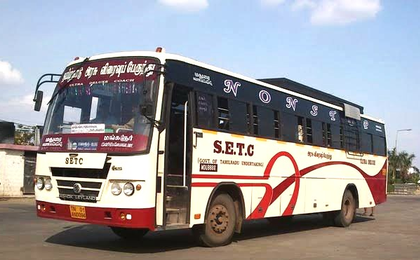TN to install 360-degree cameras, driver monitoring systems in govt buses
By IANS | Updated: June 4, 2025 08:53 IST2025-06-04T08:49:14+5:302025-06-04T08:53:13+5:30
Chennai, June 4 In a major initiative to enhance passenger safety and improve operational efficiency, the Tamil Nadu ...

TN to install 360-degree cameras, driver monitoring systems in govt buses
Chennai, June 4 In a major initiative to enhance passenger safety and improve operational efficiency, the Tamil Nadu government has floated tenders worth Rs 17 crore to install advanced surveillance and driver monitoring systems in buses operated by State Transport Undertakings (STUs).
The project is being executed through the Institute of Road Transport (IRT).
The move follows an announcement made by Transport and Electricity Minister S.S. Sivasankar during the debate on the Transport Department’s demand for grants in the Assembly.
According to tender notifications issued by the IRT, the government plans to equip 4,000 buses with 360-degree surveillance camera systems at an estimated cost of Rs 15 crore. In addition, a pilot project worth Rs 2 crore will introduce Driver Monitoring Systems (DMS) in 500 buses.
Each bus under the camera project will be fitted with four high-definition wide-angle cameras, providing a full panoramic view that helps eliminate blind spots.
Priced at Rs 37,500 per unit, these cameras will come with features such as wide dynamic range (WDR), auto white balance, digital noise reduction, and infrared capability for low-light conditions. The systems will also support encrypted data transmission and comply with established data protection norms.
Minister Sivasankar had earlier informed the Assembly that the 360-degree surveillance systems will aid in detecting pedestrians, cyclists, and other vehicles that are often missed by conventional mirrors, especially in congested urban areas.
The real-time footage will also serve as valuable legal evidence in the event of road accidents.
The Driver Monitoring System (DMS) units, each costing Rs 40,000, will employ artificial intelligence and infrared sensors to monitor drivers for signs of fatigue, distraction, or drowsiness. These systems will track eye movements, head position, and posture, and provide real-time alerts to allow for immediate corrective action.
Additionally, each DMS unit will record behavioural data to support post-trip analysis and help plan training interventions for drivers.
The current rollout on 500 buses is a pilot phase, with the potential for a wider implementation depending on its effectiveness and feedback from transport authorities. This initiative marks a significant technological upgrade for Tamil Nadu’s public transport system and is expected to improve both passenger safety and driver accountability across the fleet.
Disclaimer: This post has been auto-published from an agency feed without any modifications to the text and has not been reviewed by an editor
Open in app